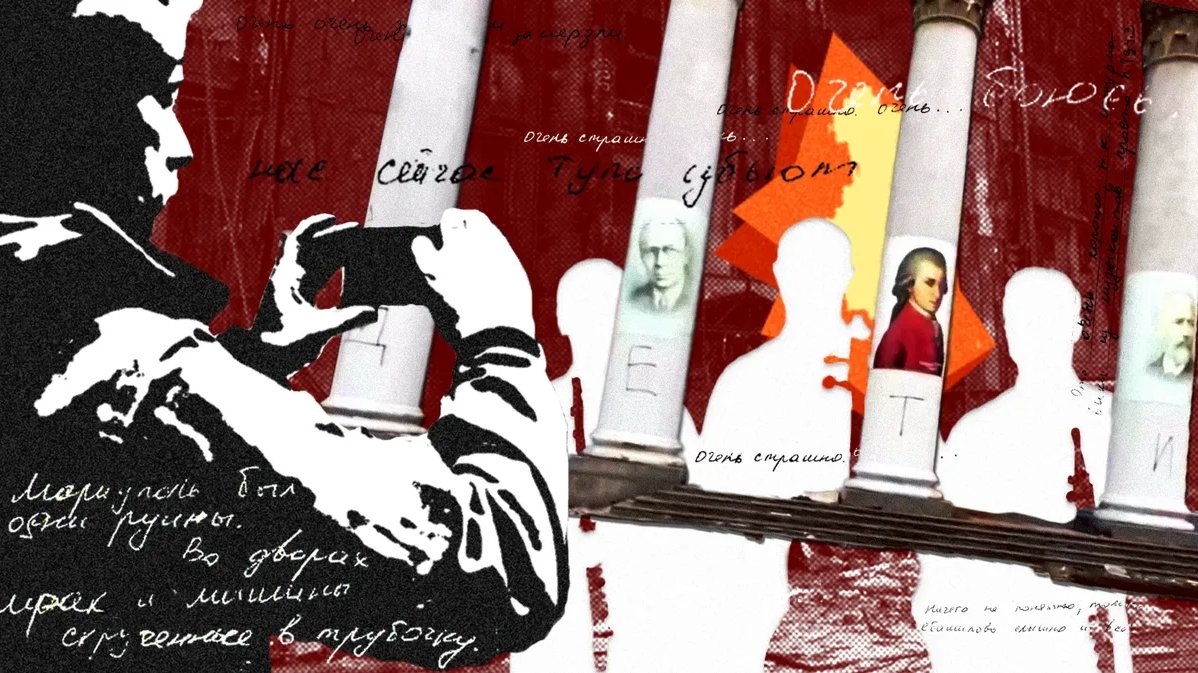Over 100,000 men have been recruited in Russia-occupied Ukraine’s Donetsk and Luhansk regions since February in what was a haphazard mobilisation move. Among the drafted were the musicians of the Donetsk Philharmonic Society who were conscripted on 23 February, less than a day before the Russian invasion began. Their management tricked them into thinking they would do a three-day military drill, but in fact they were sent into the battle zone with no preparation and were ordered to fight in the siege of Mariupol.
Matvey, one of the music society members, started writing a journal in April using a notebook and a pen he found in someone’s abandoned flat in a nine-storey building. This journal proves that the unskilled artists were sent into the Mariupol inferno without any proper training.
Andrey Kaganskikh of Novaya Gazeta. Europe restores the events of Matvey’s first week in Mariupol and discloses what he and his fellow musicians went through during the war.
"The fights started early in the morning; it was a fucking nightmare. A sniper came here and killed two men. We were bombarded by shells and mines from all sides. I was really scared and when I had just 1% of my phone battery left, I texted Anna a farewell message and pressed my body against the wall. I couldn’t help shaking, I thought the house would fall sideways,” is what Matvey wrote in his journal on 2 April. He agreed to speak with us on the condition of anonymity (his name is changed), just like anyone else from the Russia-occupied regions of east Ukraine.
Matvey says he considers himself a citizen of Ukraine; he decided not to obtain a Russian passport for political reasons. Matvey did not manage to leave Donetsk back in 2014; later on, he decided to stay with his relatives. “If there was some combat, we had to live with no electricity for a couple of days. This is something you can put up with, of course. No water, wait again. And you couldn’t go out at night because of the curfew. But I got used to it eventually,” he says.
Matvey was unwilling to fight, same as all of his colleagues that ended up being recruited; no one wanted to go to war.
They were drafted on 23 February at short notice. The secretary from Matvey’s work called him at noon, saying he had a little time to pack his things and get to the meeting point. Matvey grabbed his phone, clothes, and dry food to last him three days as he was told this was how long the drill would last.

Pavel Chuprina, a war correspondent. Screenshot from a video
A crowd of musicians and support personnel gathered near the philharmonic society building at three o’clock, all carrying bags. The men’s relatives were seeing them off. Pavel Chuprina, a Donetsk-based war correspondent and former cameraman for Russia’s LifeNews, stood across the street as he was recording an interview for a pro-Russian Telegram channel Donbassr.
Chuprina is also a videographer for the philharmonic society. In that short video, he says that about 50 people gathered near the building, some had been called up officially, others volunteered.
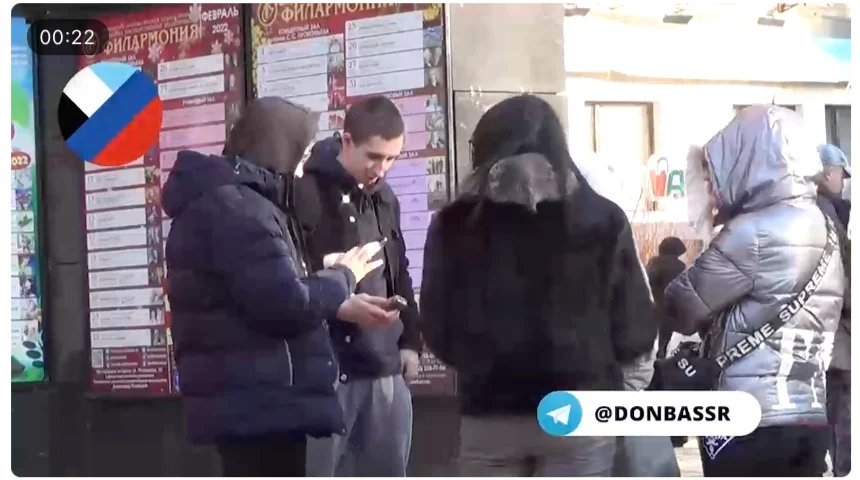
The philharmonic society staff on 23 February. Screenshot from a video
“It was total bullshit that they were volunteers,” says Anna, Matvey’s wife. She is Matvey’s colleague, also a musician. Neither her husband, nor any of his colleagues received any official notice, she says. None of them were aware they were being filmed, too.
All men between 18 and 55 years of age were subject to mobilisation in the Donetsk and Luhansk “People’s Republics”. One of the female society employees tells me that the oldest man drafted on 23 February was over 50 years old. Some musicians were threatened with criminal charges for failing to appear, but they are still formally registered as volunteers, so what Chuprina says is the official stance of the local authorities.
Even the fact that most musicians did not serve in the army did not stop the organisers of the mobilisation. Even health problems or having a small child did not help — several musicians called the administration to highlight these things but they were not excluded from the mobilisation lists. When Donetsk’s factories and state enterprises received an order to send half of their male employees to the enlistment office, that was the administration that decided which men would be exempted from the mobilisation.
The “three-day military exercise” was a lie: most of the musicians have yet to return home.
Anna and Matvey’s story is confirmed by two relatives and their colleague.
‘The Culture Division’
That same day, the musicians were taken to a conscription centre in Makiivka, Matvey says. The temperature dropped to almost 0°C at night, but the conscripts were forced to spend two nights outside.
“The woman that handed out combat boots told us to keep the boxes, said we would need them. She was right, we used them as beds for the next two nights.”
After two days, the conscripts were moved into barracks. Matvey barely saw his colleagues after that: the whole squad was divided into smaller groups. He was put in a small room with only one bed alongside seven other conscripts. They would sleep on the floor at night and load Grad rocket launchers with missiles in the daytime. It took very little time for Matvey to fall ill, same as his “comrades-in-arms”.
Soon, they met conscripts from the Donetsk Opera, the Donbas Choir, and the local circus. Most of them were musicians or singers, too, some were dancers or technical staff. They all knew each other; Matvey says the whole lot arrived on the same day, about 80 people altogether. (A member of the Donbas Choir later told Novaya Gazeta. Europe that they were also promised to complete a military exercise course, and nothing else. “A three-day exercise, that’s what they told us.”)
The entire group was nicknamed The Culture Division.
Matvey says he does not know where the nickname came from, but it became almost official as it was used by the musicians themselves, their wives, and even the local military commanders.
During the first month of the war, the members of the Culture Division were allowed to meet their relatives quite often. “He would come out of the station’s gate for 5 or 10 minutes. I would give him things, chat for a while, and that’s it. I used to visit him two or three times a week,” says Yelena, the wife of one of the orchestra men. She would bring food and medicines and wash clothes for her husband, same as other relatives.
The mobilisation in Donbas resembles a cataclysm. As per Ukraine’s Eastern Human Rights Group, a total of 140,000 men were conscripted, and almost 100,000 were sent into the battle zone. The regions of Luhansk and Donetsk are facing an industrial disaster: both due to shelling and because most of the personnel was conscripted. There is nobody left to work in factories or mines, so the local civilians often find themselves in a situation with no water or electricity supply.
Makiivka is just a half an hour’s drive from Donetsk, but not all families have personal vehicles, while buses and taxis stopped going between the cities, Anna says. All because the local men were hiding in their homes to avoid getting conscripted or killed in shelling. In February, the city’s recruiting stations literally used to kidnap men from the streets and force them into buses to escort them into the battle zone. It was a real challenge for Anna to get to Makiivka, but still she would visit her husband frequently.
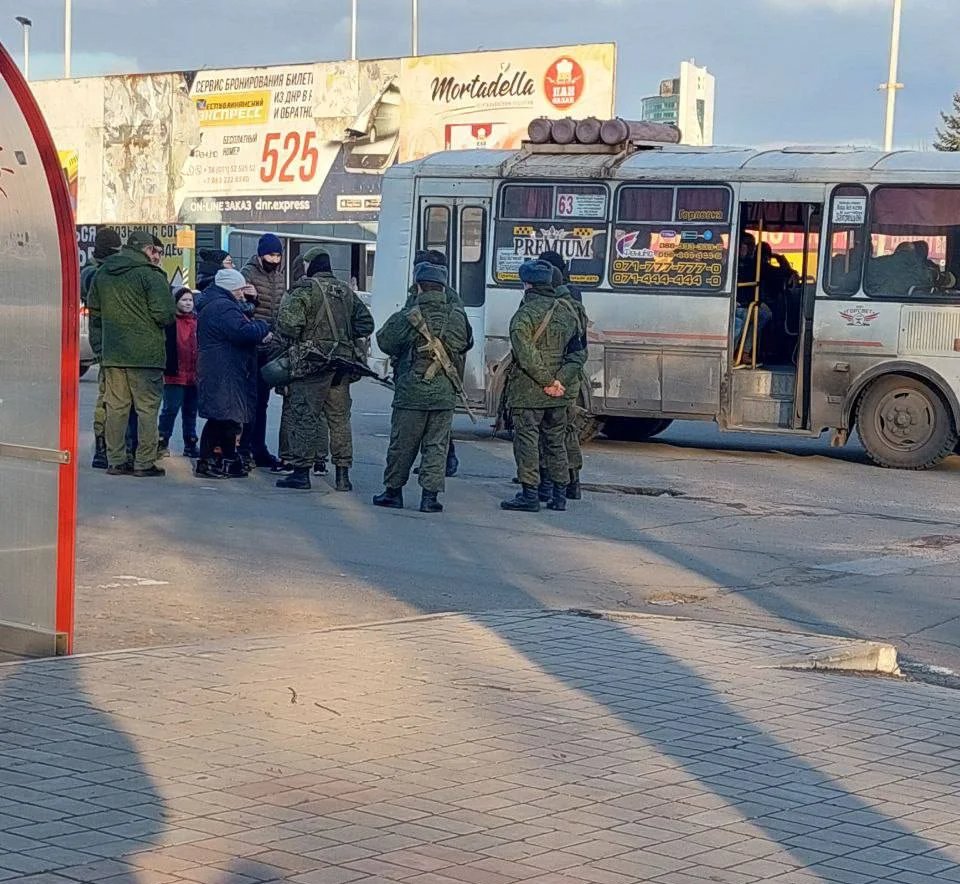
Men being conscripted in the street, Donetsk, 21 February Photo: Telegram
“All parents and wives of the conscripted men used to visit them as often as they could to show support,” Anna says.
Matvey and his fellow conscripts worked as freight movers until 27 March. On that day, they were handed military equipment: old Soviet helmets, AKs with black plastic stocks. They were not given bulletproof vests. Matvey and the relatives of his orchestra colleagues say no person from the Culture Division had any military training.
The group was forced into trucks early in the morning, where they were taught to reload their AKs as the trucks drove them into the battle zone.
The musicians would ask their commanders where they were being taken to, but none of them replied. “When we arrived in Dokuchaievsk, they asked us: ‘Do you guys really have no clue where you’re going?’ It all became clear at that point. ‘We were going to Mariupol,’” Matvey continues. “None of us wanted to go there, but no one was woesome. We all thought they would simply make us guard roadblocks. None of us had a clue half the group would be killed in the first 40 minutes of combat.”
Arriving in Mariupol
The first entry in Matvey’s journal is from 28 March: on that day, the entire group was dropped off in Mariupol. The city had been besieged for almost a month at that time: urban combat, no electricity or water, and no network connection. “The cannons were located nearby, so it was very loud out there and the shells would hit the ground every now and then. We stood in a narrow corridor, awaiting orders. When I looked inside the office, I saw blood all over the wall,” Matvey writes in his journal.

Matvey’s journal, describing events from 28 March to 11 April
There were other conscripts there, too. All of them were divided into groups of ten. “They told us to discard excessive items, said we would stay at abandoned houses. Nobody dropped anything, of course,” Matvey writes. “A truck picked us up, and we crammed inside like sardines. The truck was moving very fast, the city was but ruins at that point. There were cars twisted out of shape all over the place.”
Matvey’s group was dropped off in the heart of the city, next to the Drama Theatre, destroyed by a Russian missile. The conscripts were led into a building and told to take positions by the windows. The “DPR” commander ordered them to aim their AKs at the windows of an apartment block right across the street.
He told the conscripts there were Ukrainian snipers from the Azov regiment in that building. “If you see any movement, shoot.”
The Ukrainians whom the commander called “snipers from the Azov regiment” used single shots or spluttered fire. “They were much better at using their weapons than us,” Matvey says. The only marksman experience he had before was in a shooting gallery. Nobody from the Culture Division had any shooting training in Makiivka, the commander referred to their first shootout in Mariupol as one. Matvey says he could not shoot at living people and aimed his AK so as to miss the windows on purpose, something he continued to do in the future.
The group failed to capture the target building at first attempt. They came under fire as they entered the patio, and were forced to flee. “They started blasting at us as soon as we opened that door. It became clear that this is damn serious, and that we were going to get killed right away. <...> I could hear the bullets flying, sensed that smell of gunpowder, and saw the sparks on the ground,” Matvey’s journal reads.
He retreated and joined his comrades in a residential building: “We were ordered to take positions by the windows and shoot just anywhere to force the snipers to bend down and allow us to move.” The Ukrainian bullets, Matvey says, would literally make holes in the walls.
The conscripts were afraid to stick their heads out the windows. So, their commander was forced to shoot, and the conscripts would take cover and reload the weapons. This is how Matvey describes the end of that day:
“When our reinforcements arrived in the neighbouring house, the Ukrainians started using under-barrel grenade launchers. A grenade hit the wall just a couple of feet over my head. My ears were damaged, and I nearly fell out that window. The combat lasted until dark. We used two men to stand watch, it was complete darkness, so we could only rely on our ears. We broke into an abandoned apartment early in the morning and fell asleep on the couch with another fellow, Timokha. We soon woke up as the windows smashed and bullets burst through the walls. The combat continued.”
A burning house on Metallurg street
Matvey’s movements are detailed in the journal. His first week in Mariupol is described basically step-by-step — everything that happened that week is connected to a nine-storey brick building, the one Matvey would shoot badly at on purpose during his first day in the city. House#27 on Metallurg street.
Matvey describes how the northern side of the house looked that day: a cafe was burning on the first floor, the balconies were damaged, most of the windows were gone. One can see by the smoke residue which flats burnt down completely.
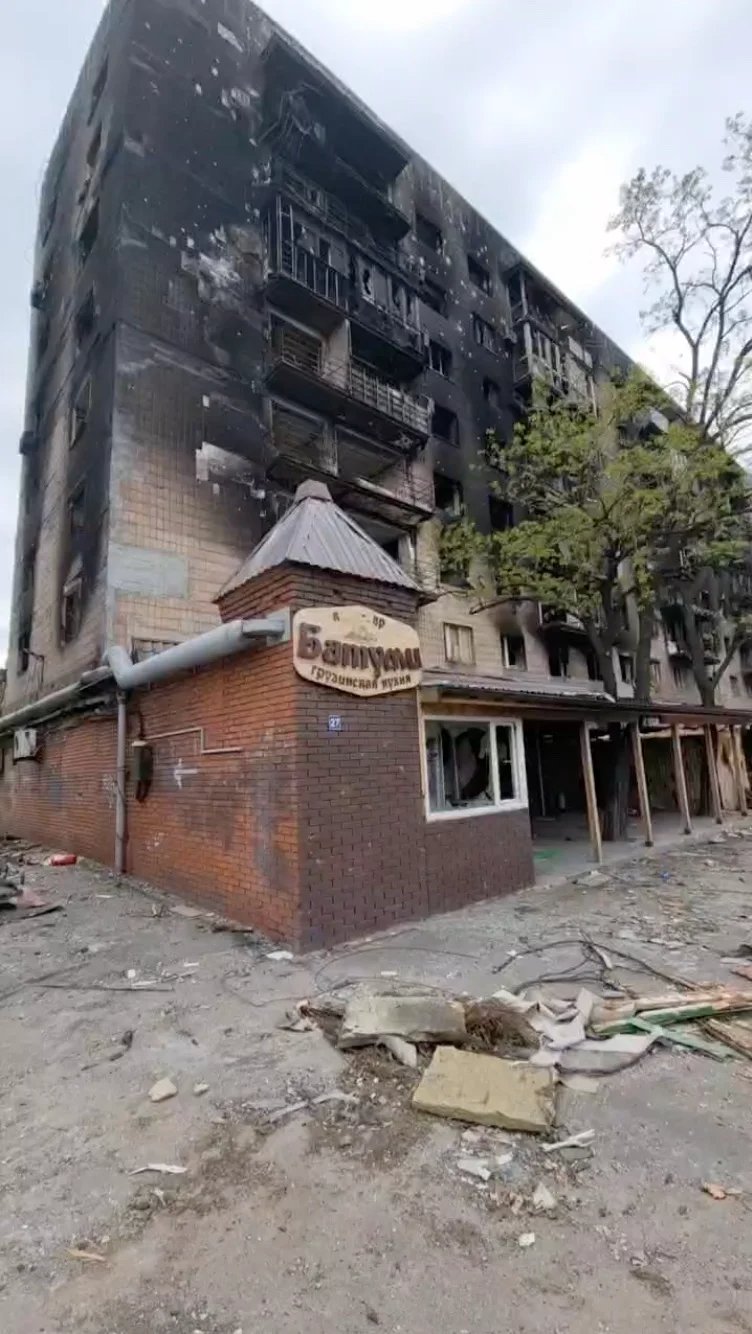
The northern side of the building shown in a video published on 13 May. Photo: Telegram
But what was happening to the house before the Culture Division arrived? That info is available thanks to the “house chat” — these are the chats citizens of Mariupol created and used to look for people they had lost connection with because of the war. Back in March, people were hiding in the basement of that building.
Kseniya (name changed) is one of the members of the chat. She lived nearby but hid in the basement of house#27. She was there when the fire started: she says that the fire erupted on 27 March, the day before the musicians arrived in Mariupol. Most likely, the house caught fire due to shelling — before the fire, there were warnings about incoming attacks. Afterwards, she heard explosions every day: “They were so powerful that the basement walls shook and dust appeared in the air.”
The basement was located near one of the seats of fire: smoke was everywhere. Soldiers told them they needed to run at the first sign of fire. “You couldn’t see anything on the street because of the thick black smoke, we were surrounded by the sound of gunshots. We crossed the street while we were being shot at,” Kseniya says when asked about the day she left the shelter. She adds that all the people managed to get out of the basement unscathed. Soon after, she was able to leave Mariupol on foot.
The burning building stands right next to a similar nine-storey house#25. Cafe and a coffee shop, a contemporary art centre, and a supermarket were all located in the building. People took shelter in the warehouse of the supermarket; there were also two basements filled with people in house#25. Nine storey houses are the tallest buildings in the district, which is why they attracted attention of Ukrainian forces as a defensive point, tells me one of the ex-residents of house#25.
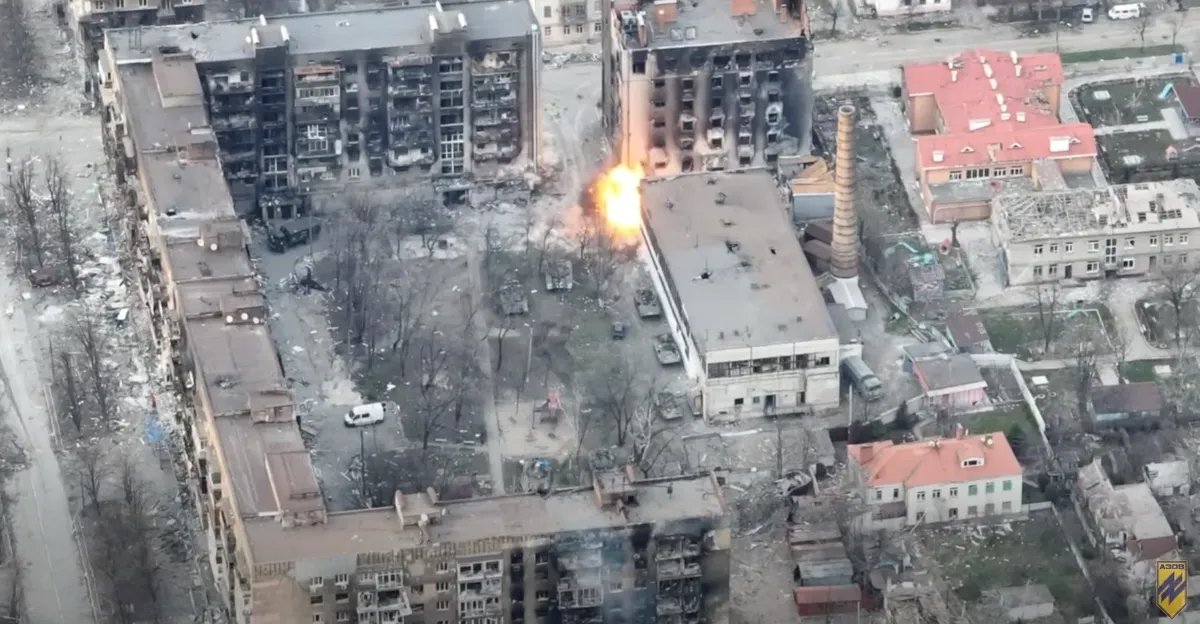
A tank battle in the courtyards of houses #25/27. The video was published on the Azov regiment’s YouTube channel on 11 April. The footage is not dated, but one can see that a lot of flats are burning. Matvey says that at the beginning of April he did not see any tanks in the courtyard.
House#25 got less damaged during the fire — according to the messages in the chat, dozens of people returned to the basements to hide after the fire on 27 March.
They were hiding in there while Matvey’s group was trying unsuccessfully to capture the adjacent building.
“Don’t worry, there are no civilians here. If you see a person wearing civilian clothes, it’s definitely [Ukrainian soldiers] wearing them,” Matvey retells his commander’s words. Later on, in a different part of Mariupol, he saw a group of mobilised soldiers shoot a local man in his fifties — the man was running towards a hiding place when he heard the gunshots. “Why shoot him? No one knows. He was just walking, he didn’t do anything. They just killed a civilian for no reason.”
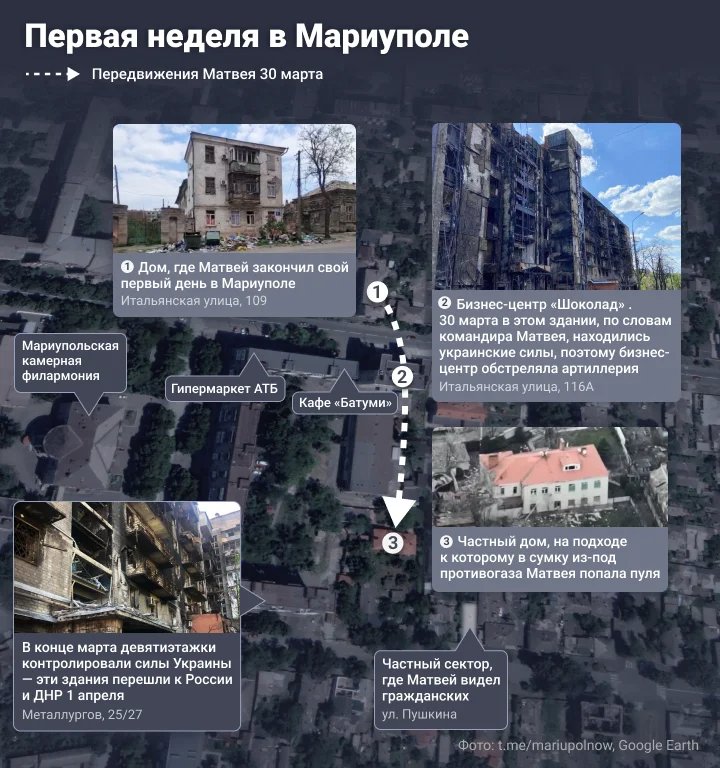
Illustration: Novaya Gazeta. Europe
In the early hours of 30 March, according to the house chat, Ukrainian soldiers evacuated people hiding in the basement of the nine-storey building and from basements of buildings nearby. That day, the shooting started early too, writes Matvey. His group was still in the house on the nearby street, the one they had ended up in during the unsuccessful assault during the first day.
Soon, their commander ordered them to lie down: artillery attacked a building just a hundred feet away from the house where Matvey was. It was a business centre standing near the nine-storey house, where, according to Matvey’s commander, the enemy was hiding. “There was nothing there but black concrete, ashes, and burnt down metal. No bodies either. We stayed in that place and watched. I was very scared. If they had attacked us, we all would have fucking died,” writes Matvey.
Matvey’s group then moved towards a big private building across the courtyard of the nine-storey house, the private building was located 300 feet south of the burnt down business centre: “We ran while mines blew up basically near us, the shards kept falling on our helmets.” At the front of the private building, he was almost hit by a bullet, Matvey writes. It hit the bag hanging from his shoulder instead — the bag was used to hold a gas mask in Soviet times but, now, it held Matvey’s variety of bullets, from five different magazines, which his commander told him to put there.
They managed to secure their position in the private building. The combat went on:
“The commanders found a bazooka and used it to fire at the nine-storey house (house#25 — translator’s note) during nighttime. We got shot back at.
One night, my friend Timokha and I were starting guard duty. It was so dark that I almost shot a cat.
The night was quiet, except for the nine-storey house burning and smog and fumes in the air.
we are very very cold [written in big letters].”
Next morning, Matvey was transferred to a new commander from the people’s militia — he saw that mobilised men did not want to go into combat. Musician wrote down how this militiaman “trained” him: “Do you want to go to them [Ukrainians]? I will shoot you. Do you want to go back? Without me, the guys will shoot you from behind.” The commander was Chechen, it was his third war, then he tried to encourage Matvey: he told him that he was afraid, too.
Where his commander found alcohol on that day or what he was drinking, Matvey does not know. But he remembers the smell of alcohol. It was after Matvey had finished his guard duty, the Chechen woke him up: “During one night, he [the commander] got wasted and lied down next to me, then he suddenly picked up his gun and ran off somewhere. Then he remembered himself and just sat there, playing with the fuse. It was creepy but I managed to fall asleep.”
The sea view and war view
The locals were still present in the private area where the house secured by Matvey’s unit was located — he saw them prepare food on the street in the morning. “Shockingly for me, the locals loved us being there,” he writes. The little piece of land made neighbours of civilians and soldiers of both sides, the shootings happened close by. The combat zone Matvey took part in was also not large — from the moment of the first exchange of fire, Matvey did not move further than 600 feet from the nine-storey buildings. The entire time, the “DPR” forces were attacking the two nine-storey buildings.
Matvey’s group managed to secure house #25 only on the fourth day of combat, 1 April. According to Matvey, that is where he found a notebook and a pen and started to write down everything that had happened since his first day in Mariupol.
In the courtyard, Matvey saw craters, bodies covered with sheets, and burnt down cars. From the window of a flat on the sixth floor of the building, Matvey could see the sea. This is from where Matvey followed fighting on Metallurg street and saw shells coming from the direction of Ukrainian soldiers hit the building — it was their turn to fire at the nine-storey buildings.
Phones stopped working in Mariupol back at the beginning of March, but after the appearance of the people’s militia, the city also saw base stations of the Donetsk mobile provider Phoenix appear on the streets. Thus, at this altitude, Matvey managed to catch a signal and call his wife for the first time since his arrival in Mariupol.
While Marvey was calling Anna, she was standing in a three hour queue for potable water: “I stopped taking the phone with me when leaving the house, I gave up hope that he would call. I broke down crying when I realised that I had missed his call and won’t be able to hear his voice anytime soon. I came home about five minutes after his call and called back… He was sitting there and waiting for my call.”
Matvey does not want to be away from his wife: in almost every entry in the journal, he writes about how much he misses Anna and reports the times when he manages to see her or talk to her. One time, he dreamt of her. The journal entry on the subject paints a picture: in his dream, he and Anna, holding hands, cross a road, while cars keep running people over.
During their call, the war went on on the street: “The combat raged on, I felt that one more moment and that’s it, I’ll be a goner,” musician wrote on 1 April.
Artillery was attacking the nine-storey building again. Matvey kept to himself, the house shook. His commander, making it look as if this were a big favour, let him charge his phone using the generator. The locals showed up from somewhere, so they, Matvey, and his friend all together started following the fighting outside, later, one woman gave them a pan full of porridge. Time passed, and Matvey “didn’t fucking care” about the house shaking anymore. According to the journal, this is how the next two days in the house on Metallurgov street passed and how Matvey’s first week in Mariupol ended.
At the same time, Russian forces moved further into the south, in the direction of the sea — first, they captured the stadium Azovets and the private area nearby, then they continued pushing back Ukraine’s troops towards the embankment.
Before leaving the nine -storey house, Matvey found a postcard with a poem written on it titled Allow yourself to dream — this is the phrase the poem starts and ends on. That night, he called Anna again: “Maybe this is God giving me a sign that everything will turn out okay. I read the poem to Anna, we both almost cried and felt very emotional,” he writes in the journal. “We cried together. Both of us had scary thoughts in our heads — we knew that it would take a miracle for [Matvey] to come back. This was kind of a sign for him that he would survive and be able to turn his life for the better,” says Anna.
“My health is not improving, and the worst part is that I’m getting used to it,” Matvey wrote on 4 April. Soon, the entries stop for a while — Matvey had to leave the journal and his other personal belongings behind — he left everything in the buildings where the “DPR” forces were based before the next redeployment of soldiers inside Mariupol. Matvey continued writing when he found a new journal — later on, he found his lost personal belongings. The entire time, he kept his journal hidden from commanders: he wrote entries when no one saw.
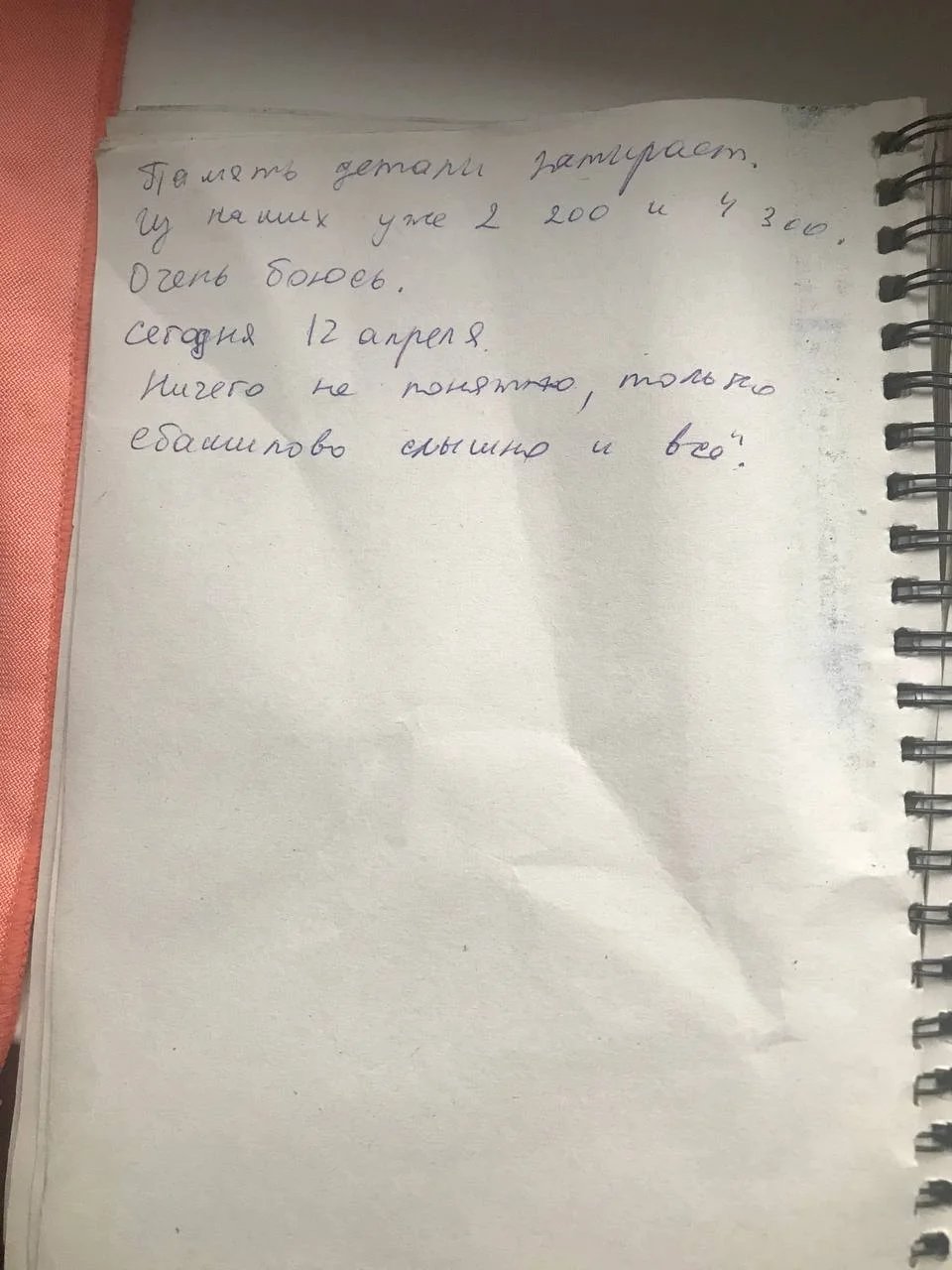
The last page of Matvey’s first notebook. On 12 April, he was aware of two killed and four wounded members of the Entertainment Division.
Self-made bulletproof vests, hunger, and looting
In April, Matvey was sent on the front-line in different districts of Mariupol several times. “It’s scary, we don’t know how to do anything,” he says. But some days were relatively calm: quiet guard duty, trips to military bases, and non-combat tasks. “Carry something, bring something, clean something,” Matvey lists.
In the journal, Matvey describes several times how he came under fire. One time, an artillery attack almost killed some of their own men from people’s militia; another time, the enemy hit the allies’ tank near Matvey: “The explosion was so big that I thought the house had collapsed. The tower jumped up to the level of the fifth floor.” In the first half of April, there is combat mentioned almost constantly in the journal entries, but this is a journal of a musician and not of a soldier — Matvey barely describes what happens during military action. For the most part, he lists the tasks he was given, the events that took place and describes his fellow soldiers and commander, and what everyday life looked like in the abandoned flats. That is where the mobilised men lived and fought, but those same flats were looted by them in search of food.
“Looting is a survival method during war,” a commander told Matvey when he first brought in looted food. By that point, the only food left in the flat were things that did not expire for a long time, for example, canned food or candy. “[People’s militia commander] kept the good cigarettes for himself, gave me a pack of cheap ones and said: do not waste them. Basically, he stole the cigarettes that were for all of us. But fuck it, he’s the commander,” writes the musician. One pack of cigarettes traded for being able to charge one’s phone from the generator.
Looted things were used too: fur coats and sheepskin coats were thrown on the floor to sleep on them. Matvey also checked all laptops to see if he could charge his phone through them but they were always fully discharged.
In May, Matvey wrote in the journal: “Yesterday and today, I went into combat and fired at Ukraine’s tank. Guys are professionals, they fulfilled their objective and very quickly left, we couldn’t even aim at them. So we went to work and dug up a basement entrance… I looked at so many photos of people that used to live here… now, everything is destroyed…” that was when Matvey was already serving outside Mariupol.
Other artists he knew also had problems with provisions, Matvey wrote: “Timokha wrote back, they are fucked over there. They don’t have water or food, for a third day in a row the only thing they do have is guns. Poor lads, what did they do to deserve this… It was a lucky coincidence that I didn’t go with them.”
“In Mariupol, they were given food a couple of times, the rest of the time they had to find food themselves,” tells me Yelena, a wife of one of the mobilised musicians. Leftover food was found not only in abandoned flats but also in warehouses and ex-head quarters of Ukraine’s Armed Forces. Sometimes, the citizens helped with food and medicines — Yelena says that her husband was scared to take food from them because there were rumours that the locals were poisoning soldiers. But there was no other way. She assumes that the locals felt bad for men mobilised from the “DPR”.
In text messages, Yelena’s husband tells her about the warfare. He writes about the lack of food and water, about how cold it is and how ill he feels: “Everything hurts… Nose and throat hurt (the throat never stopped hurting)... Now the kidney hurts too, and the back… And my legs are aching from the cold.”
The gear the people’s militia fighters get equipped with leaves a lot to be desired: although the musicians got handed out brand news AKs, there are photos and videos on the web of the “LDPR” soldiers holding Nagants, rifles that were discontinued in the USSR after the Second World War. Matvey himself had seen soldiers with “ancient rifles”, while in the nine-storey building on street Metallurgov there was a machine gun that the “DPR” soldiers nicknamed Dashka, it must have been the Soviet machine gun DShK developed back in 1938.
There are problems with the uniform too — Matvey’s fit him, but not everyone’s did. Some things handed out could be in the wrong size, or they could be not handed out at all — for example, summer uniform or trousers. The musicians received Soviet helmets but no bulletproof vests — some of them had to find one themselves, just like the food, say their relatives. Matvey tells me that one time he found NATO-issued bulletproof vests in a former warehouse of Ukraine’s soldiers, but they were confiscated by the people’s militia commanders. “They said: hands off them! They didn’t give us anything.”
In the end, says Matvey, he made a level four bulletproof vest himself from the pieces he found: “I had to add more straps on it because it wouldn’t stay the fuck on, it would slip down: while walking or running, it didn’t protect anything but my gut.”
The musicians that did not have body armour got sent to work in the “clearings”. That is a procedure of searching a building, in which the enemy or civilians could be at. Fortunately, during the clearings, Matvey never once encountered the enemy.
Once, during a cleaning of a private area, Matvey’s unit met some locals that were holding a wake for victims. The locals gave soldiers food and coffee. The locals’ mood is described by Matvey in the journal as: “Everyone has no fucking clue what’s going on and no one wants this war.”
On 18 April, Matvey wrote in the journal:
“Even though I look and smell awful right now. Even though I had to do immoral things (break into flats, loot) and criminal things (shoot at live targets) I am still a person, and I know who and what I am.
You can scare me, make me, order me… But I know who I am and what I believe in. I am a person, not a freak. This war is trying to turn me into a fucking monster but I won’t allow it to.”
‘We were made into an assault brigade’
Matvey and Yelena think that the musicians were used for reconnaissance of enemy’s firing points. Matvey realised that when he saw the artillery focus the fire flow after one of Matvey’s fellow soldiers had been hit in the leg. How the commanders saw its task in reality, Matvey does not know — he was not explained anything, he was just given orders where to go or shoot. “When you try to ask them something, you either get looked at as if you were crazy, like, why are you asking such stupid questions. Either just get told to fuck off,” says Matvey.
The commanders were quiet before the departure for the Azovstal steelworks — they were driven there from the other part of the city for eight hours at the minimal speed and with the lights turned off.
The Azovstal assault was being followed by the entire world — for two months, the combined forces of Russia and the “DPR” tried to capture the steelworks that became the last stand of the Azov regiment fighters. It is a large territory: Azovstal goes on for 11 square kilometres so the steel plant is sometimes called a “city within a city”.
On 19 April, a representative of “DPR”‘s people’s militia Eduard Basurin said in an interview to Russian state TV channel Rossiya 24 that only “assault groups purposefully selected for the assault of this object” were taking part in the offensive on the Azovstal steelworks. According to Matvey’s journal, on that day, he was in the industrial zone of the steel plant.
Matvey tells me that, there, his group was capturing already cleared locations. But it still was not safe: “Suddenly, a bullet can come from anywhere, and the only thing that one can hear is a silenced shot. It’s such a distinctive sound, not like a shot from a rifle. And near you, a wall collapses, that means that it had almost hit you instead,” Matvey says.
In the journal, he writes that he was in the industrial zone’s outskirts, preparing a dead soldier’s body to be loaded up in an armoured personnel carrier: “The head is in pieces, the body is whole, we put it on a blanket. He was already smelling. Everything going on at Azovstal is hell on earth.” In the evening of the same day, Matvey and his colleagues told their new commander that “we are not assault prepared soldiers, we are musicians” — he eventually gave an order to use the artists only for security.
According to the journal, Matvey was moved from the territory of the steel plant on 21 April: “Closer to ten [in the morning], we were suddenly and, as usual, accompanied by a lot of swearing, rounded up and moved into an armoured personnel carrier.” At exactly 10:00, the Kremlin published a video filmed at the meeting between the president and the defence minister: Shoigu said that Mariupol had been “liberated”, and Putin cancelled the assault on the Azovstal industrial area. In total, Matvey spent several days there.
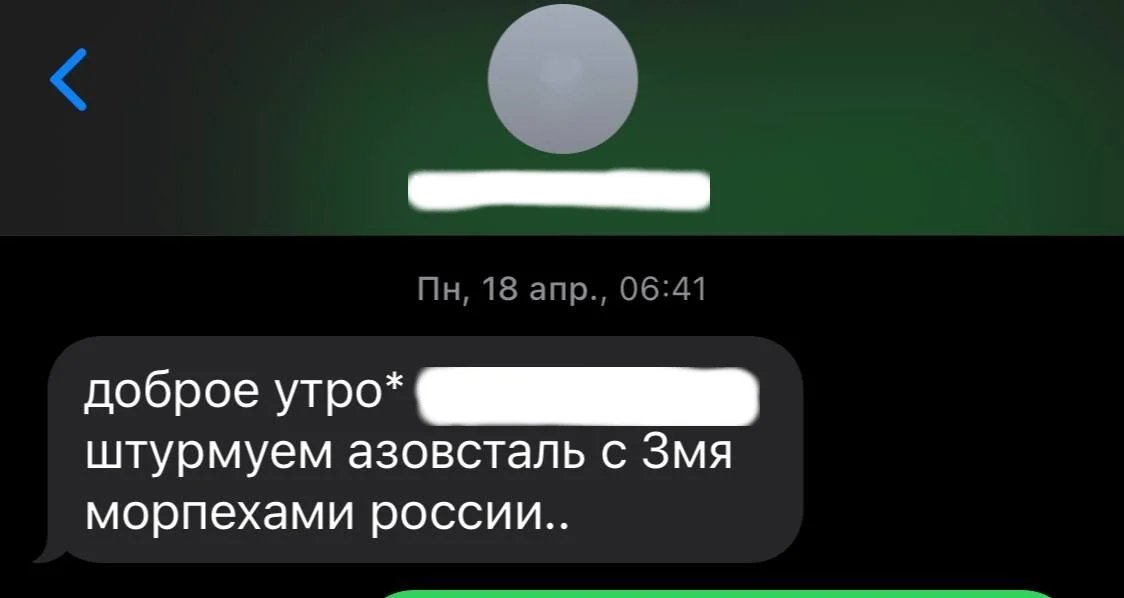
A text message from Yelena’s husband saying “good morning* <...> we are taking azovstal by force with 3 russian marines..”
Yelena found out that her husband was in that area from a text message — the text came in the early morning on 18 April. Interlocutors of Novaya Gazeta. Europe do not know how many members of the Entertainment Division exactly were involved in the Azovstal assault. Matvey thinks that, one way or another, all musicians went there.
“On TV, they say that the first ones to go into combat are contracted servicemen and the army, only then do the mobilised men go. In reality, the mobilised soldiers were the first ones thrown into the front-line fire. We were made into an assault brigade, they sent us to clear out the city blocks full of multi storey buildings. The enemy sat in those buildings, we had to kick the enemy out and keep our positions secure,” a Luhansk Philharmonic Society musician Kirill tells me.
According to Kirill, in the “LPR”, musicians were drafted on the same day — on 23 February. Kirill and 23 of his colleagues were sent to the “drills”. The administration warned them about the drills beforehand but lied about the military tasks: the musicians were told that they would be guarding social facilities in the “liberated” cities. They did not receive any summons, Kirill says, the mobilised men are registered as volunteers. They were also sent to Mariupol.
“They just handed us the weapons and that was it. We learned how to shoot AKs, RPGs, and machine guns on the fly.”
He tells me about the siege of a multi storey building at the end of March: eight musicians got injured during the first minutes of the assault.
“We crossed the road and spread out over the building the enemy was in. Grenades started flying down from the windows. There was basically nowhere to hide, the entrances were on the other side of the building. There were 200 of us storming the building, only 100 came back — the rest got wounded or killed.” Kirill says that his colleagues escaped with light injuries.
In April, the musicians were contacted by the channel WarGonzo that belongs to a Russian war correspondent Semyon Pegov — later, Kirill and his colleagues became protagonists of a short documentary film made by Russian rapper Husky titled Philharmonia Group (a play of words of Wagner Group — translator’s note).
Kirill liked Husky but, according to him, a lot was cut out of the film: “The only thing they left in were the parts where we talk about how we didn’t know how to do anything and learned everything on the go, how we stormed and defended our positions. They made heroes out of mobilised men.” However, after the film had come out, volunteers began to help the Luhansk Philharmonic Society artists and other mobilised musicians.
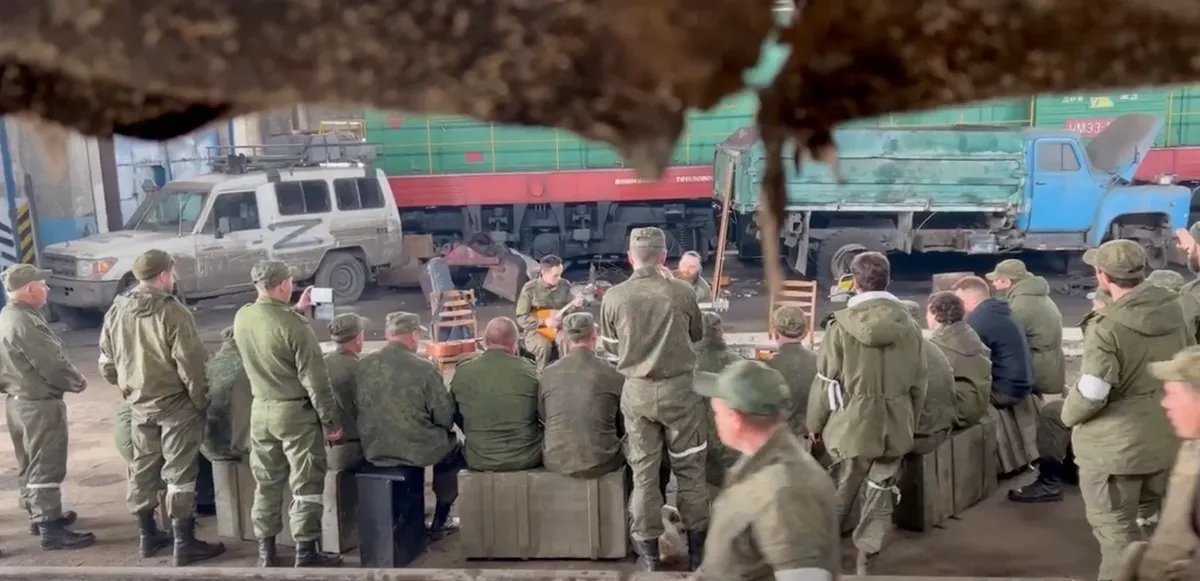
The Luhansk Philharmonic Society musicians give a concert for other mobilised men. Screenshot of a video
‘Marupol’s cultural life is being restored’
On the evening of 22 February, before the mobilisation of the musical field’s workers, Telegram channel Donbassr published a fragment of an interview with director of the Donetsk Philharmonic Society Alexander Paretsky:
“Artists always stand with the people, they are always on the front-lines <...> Depending on what they are capable of doing, and in this instance, who’s brave enough to go, who is healthy enough, I am sure they will be ready; if they know how to use weapons, they will go, even in combat, to protect their homeland”.
The monologue was filmed in advance — another fragment from the same interview was published on the channel six days before.
Paretsky is 37 years old. He has been working in the Donetsk Philharmonic Society since 2008. Before, he was a vocalist, combining singing in the society with a job as a toastmaster; later on, he became a soloist. In 2014, the new authorities appointed Paretsky Minister of Culture. He served in that position for less than a year, then he declared he was leaving the post; the Ministry of Culture appointed him head and artistic director of the society. Paretsky did not give up on performing even while serving as a minister, nor now — you can hear him sing, for example, in a video released by the Donetsk Philharmonic Society last year featuring a patriotic song Take us home, Motherland!, in which the director had a solo.
Anna tells me that after 23 February the relationship between the administration and her and her colleagues deteriorated: they had promised to protect artists from the mobilisation — and later on, promised to help them come back from the front-lines. “They [the administration] made the lists themselves [of the people to send to the “drills”]. Somehow, that list didn’t include anyone from the administration or any conductors, meanwhile the director [Paretsky] was on a sick leave,” Anna says. After the exercises were supposed to end, the administration did not answer the incoming phone calls for a long time, according to Anna.
Mass cultural activities have been suspended in the “DPR” since 18 February — no concerts will be held at the society building until the end of August, but the musicians continue working. The artists perform in military hospitals for the wounded and record concerts, for example, for Russia’s Day.
In May, 10 musicians of the Donetsk Philharmonic Society went on a tour across Siberia; in June, the hall’s Chamber Orchestra Viola performed on Red Square in Moscow. On 23 February, two of the orchestra’s members were drafted, an anonymous female employee of the music society tells me — a bass player and a drummer, they had to be replaced with musicians exempted from the mobilisation for the Moscow concert.
- The Viola Orchestra drummer’s name is Viktor Petenko — he became the protagonist of a documentary film made by RT titled Theatre of War, its plot centred on the mobilisation of the “DPR” artists. In the film, it is clear that Petenko was serving in the same district as Matvey. During the filming, the drummer was wearing a modern helmet and a bulletproof vest, which, according to Novaya Gazeta. Europe’s interlocutors, the musicians were not equipped with.
- A lot of musicians saw the trumpet player Alexander Pristensky refuse to hold a weapon “according to his spiritual beliefs”, says Matvey. Pristensky himself told this story to a news outlet Izvestiya: he agreed to wield a weapon after having been made commander. “First, I took a gun into my hands, then an AK, no choice left,” he explained. At the end of April, he was in a hospital with a shred in a knee joint — there, he watched the concert that his colleagues were performing for the injured soldiers, reports Izvestiya.
- Another philharmonic society musician gave more front-line interviews than all of his colleagues combined. The man is vocalist François Mauld d’Aymée — he went to serve as a volunteer after being excluded from the 23 February mobilisation lists. Mauld d’Aymée came to Donetsk in 2014 from France. In his home country, he graduated from a prestigious military academy, then fought in different hotspots. “I dream of witnessing the collapse of the European Union and the end to the US’ imperial ambitions <...> I think that the Kremlin is the last European stronghold,” he told journalists from Sevastopol in 2015. In the “DPR”, Mauld d’Aymée works both in the philharmonic society and the youth parliament.
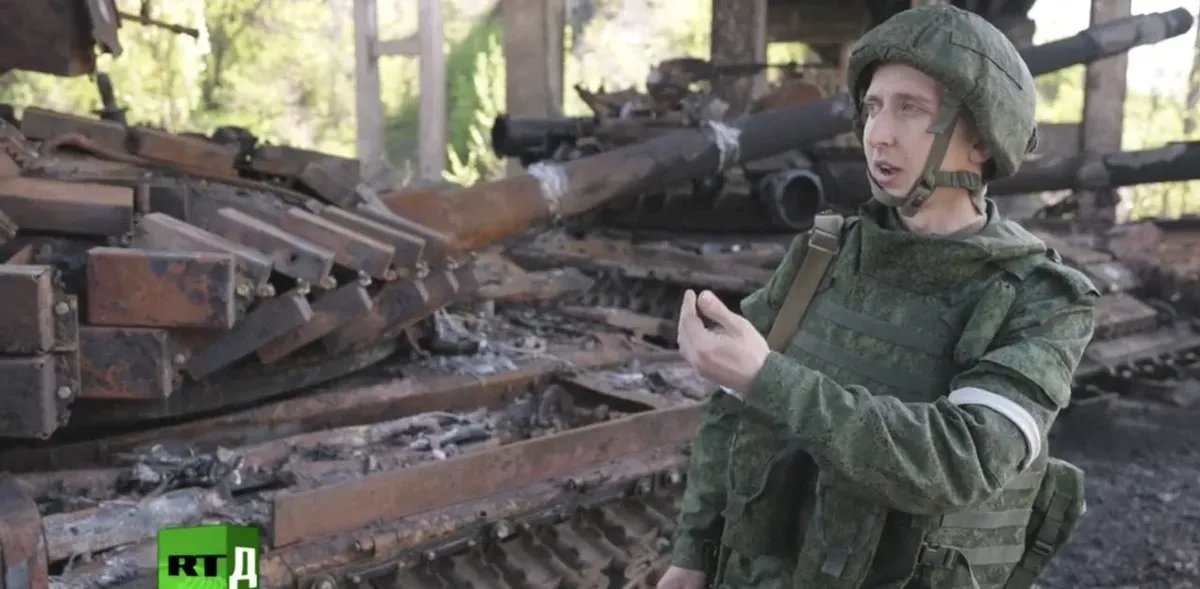
Viktor Petenko, musician from the Donetsk Philharmonic Society, wearing brand-new helmet and bulletproof vest. Screenshot: video
The society musicians that were not drafted ended up playing a concert in Mariupol on 9 May — during the performance, the artists were all wearing T-shirts with symbols “Z” and “V” on them. Later on, Alexander Paretsky came to the city — to discuss the opening of a local branch of the Donetsk Philharmonic Society.
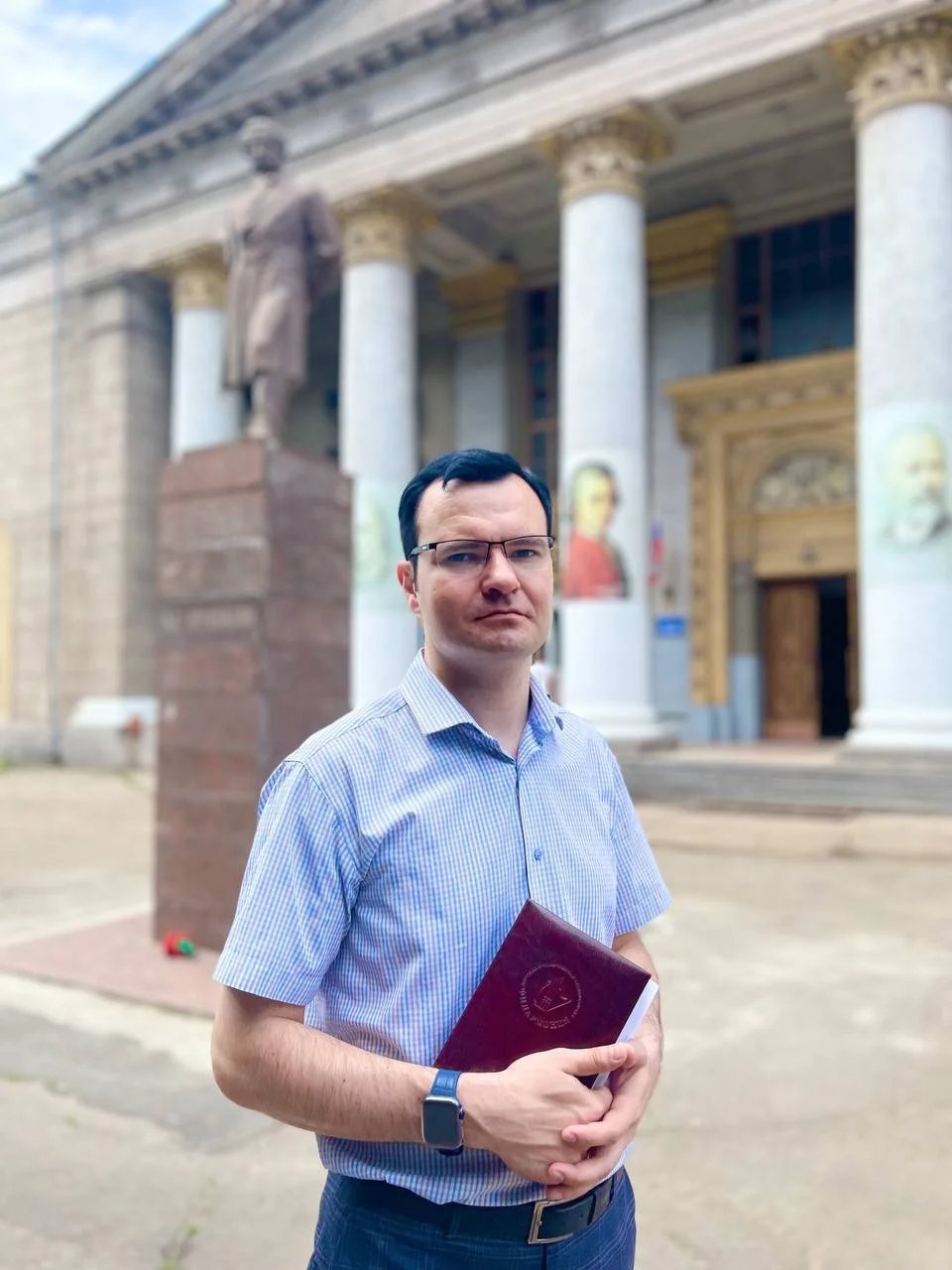
Alexander Paretsky pictured in front of the Mariupol Philharmonic Society on 28 June. Paretsky is facing the burnt down building on Metallurg street, which Matvey’s unit tried to secure. Photo: Vkontakte
Paretsky is on record saying that ex-employees of the Mariupol Philharmonic Society are now playing in the orchestra of the local branch. “It [the Mariupol Philharmonic Society] was founded in 2018 to counter the Donetsk one. In the beginning, the Ukrainian authorities wanted to found one big Donetsk Philharmonic Society, which would be based in Mariupol. But to call three small ensembles a philharmonic society is a stretch. So, the attempt failed. As is customary in Ukraine: create fakes and false structures,” Paretsky said, as quoted by the TV channel 360 website.
The building of the Mariupol Philharmonic Society is across the street from the nine-storey buildings on Metallurg street, the unsuccessful assault of which was the start of Matvey’s first week in Mariupol. In the footage from April, one can clearly see a writing spelling out the word CHILDREN on the columns of the society building.
After the fire in the nine-storey building, when the people hiding in the basement had to look for a new shelter, a lot of them ended up in the basement of the philharmonic society — that info is known because of the house chats’ messages. A lot of people hid from the war in that building — at the end of March, there were up to 1,000 people there, according to media and chats’ messages.
In a recent video with footage of the Mariupol Orchestra rehearsals, the writing on the column is gone, as expected. The video was published on the page of the Donetsk Philharmonic Society with the title Mariupol’s cultural life is being restored in July. A week later, the orchestra gave a first concert in the occupied city — they performed in the park on 17 July, Day of Metallurgist. The musicians were being directed by a conductor from the “DPR”. In the performance video published by the Russian state news agency TASS, the orchestra is getting applauded by a small crowd.
Paretsky told 360 that Mariupol’s philharmonic society employees would start earning more than before, under Ukraine’s leadership. He called the concert “an indicator of the city being alive”, after it had become “a never-ending construction site”. Then, Paretsky talked about the destruction of Mariupol and Ukraine’s Armed Forces blowing up the Drama Theatre; he said that the orchestra was made up of “our people, Russian people”.
Alexander Paretsky did not answer Novaya Gazeta. Europe’s questions — among them a question on how the Donetsk Philharmonic Society chose which employers to send to the military exercises.
Back to the front-lines
“The war is the worst thing to ever exist, especially when you’re the one on the front-line… I am tired of everything, of being afraid, of being sad, and every day my hope dies a little more… But I continue to hope for the best, that I will come home to my beloved wife.” While at Azovstal, Matvey wrote in the journal that he hoped to go back to his family after three weeks at the front-line in Mariupol. He was indeed given a few days of leave — before he was taken back to the front. He was transported from the combat zone but he was not allowed to go home: “My emotions swept me up <...> I almost started sobbing, I wanted to just jump out of the vehicle going at full speed and run away.”
After, when it was safe, he met the other mobilised men: “The ones like us (those who came back from Mariupol) were terrified of going anywhere. Those that did not take part in combat instead were in high fighting spirits.”
According to Matvey, during his 23 days in Mariupol, he finished only one clip (three more magazines of Matvey’s AK were used by his commander). During the same period, he filled up 25 pages of notebooks.
Matvey says that he found a Ukrainian flag in Mariupol — that became one more secret of his, which the commanders did not know about. He hid the flag in his personal belongings and brought it back with him — together with the postcard with the poem and the journals with his front-line musings. We agreed that to keep his identity anonymous this is the moment where we stop telling his story. The future fate of the musician is known to Novaya Gazeta. Europe. He continued to write in the journal.
After Mariupol, the musicians were sent to other military destinations. Some of them ended up very far away from home: in the Zaporizhzhia or Mykolaiv regions, others were sent to Marinka, a small city close to Donetsk, which has remained under Ukraine’s control for the past eight years. The media reported on several occasions that, during that time, Ukraine’s Armed Forces had turned the city into a fortress. According to the intercepted messages published by Ukrainian renaissance in May, the “DPR”’s people’s militia suffered significant losses in Marinka. In the recording, an unknown woman starts crying and says that out of 1,500 men sent to Marinka only 30 came back.
According to Yelena, out of about 80 Culture Division men only about 10 still remained at the front-lines in June. Yelena knows this because she is in contact with the relatives of other mobilised musicians — the entire time, they have been exchanging information received from their close ones at the front-lines. The majority of musicians were wounded and ended up in a hospital, a few of them were killed.
“It’s clear that the medical leaves will come to an end at some point. Some hope for demobilisation, some — for the war to end. Everyone hopes that by the time the guys are discharged, everything will have been sorted out,” Yelena says.
Concussions, wounds, heart attack, appendix, bronchitis, and pneumonia — Anna lists the diagnoses of 15 musicians that ended up in a hospital. Although some of them, she says, were not given medical leave so they remained at the front-lines.
The artists’ families tried to bring them back, Anna says — they wrote collective letters to the official “DPR” structures and even to the Russian ones, they contacted the philharmonic society’s management. None of their actions led anywhere.
Having become desperate, the artists’ close ones published an open letter online:
“All the artists belonging to official cultural facilities were sent to war by force, however, they are registered as volunteers. <...> The situation is catastrophic, seeing as the government spends at least 16 years to train an artist with higher education. They are indispensable at work and are completely useless in combat.”
After Mariupol, the mobilised men could see their relatives again — at military bases, in between the trips to the front-lines or in hospitals. “He was exhausted, he had mud completely sunken into his skin. They haven’t really washed for two months,” Yelena describes her husband’s appearance during one of these meetings. She says that the artists became very thin during the war. “All of them have lifeless eyes. Everything they saw and went through. It’s terrifying.”
Pianist, cellist, flautist
Anna says that, in between the calls from Matvey, she would cry out of desperation. Life was especially hard on the days when the information on the killed soldiers would be made known. The musicians told their relatives who had died, and the relatives would share the information with the other artists at the front-lines: “Information on the killed spread immediately between all of us,” Anna says. Most often, Matvey would find out about his colleagues dying from Anna.
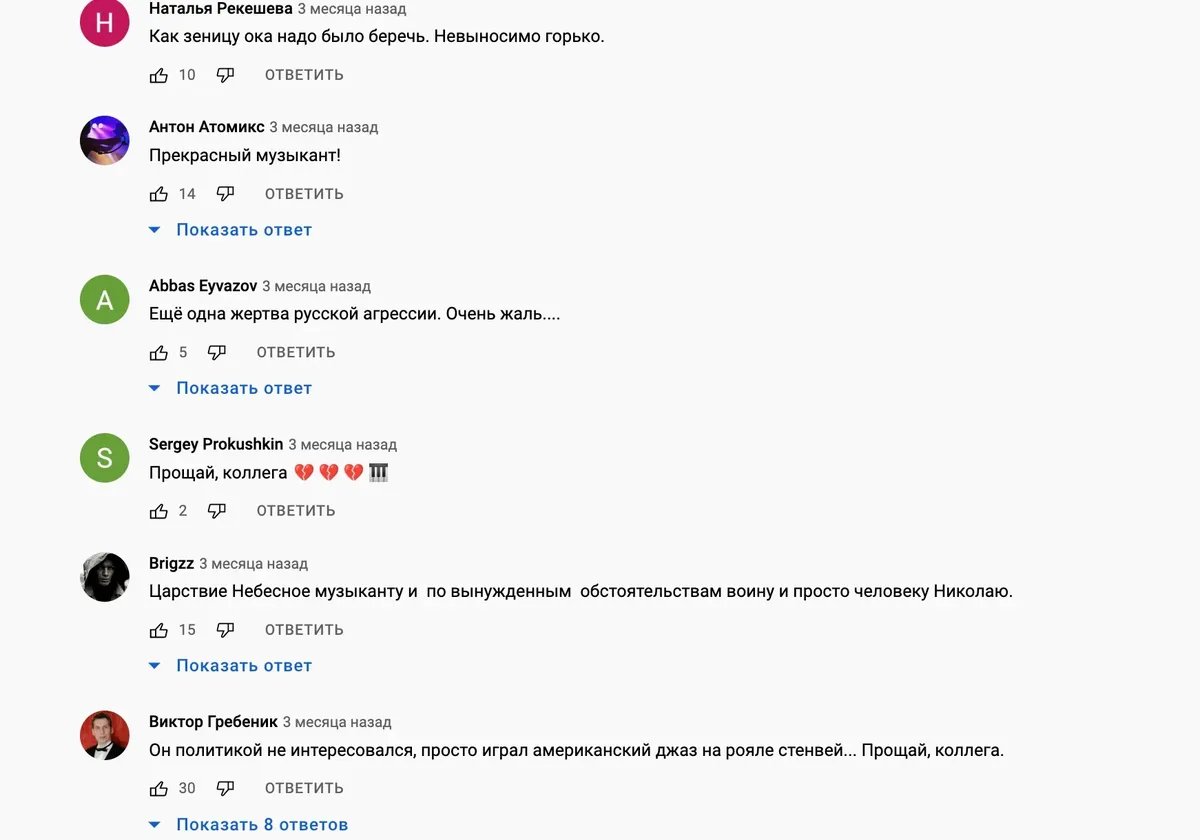
Comments under a video of a concert performed by pianist Nikolay Zvyagintsev
Publicly, the news about the first killed member of the Culture Division was shared on 12 April, a day before the memorial service. An obituary was published on the Donetsk Philharmonic Society Vkontakte (Russia’s main social media — translator’s note) page, it was dedicated to the 39-years-old Nikolay Zvyagintsev, pianist and jazz musician. It said that he “had died during the liberation of Mariupol”. He was survived by wife and daughter, who had just turned one before his death.
“Yes, he was not asked whether he wanted to go, just as many others weren’t, but he told me: ‘Sveta, if it’s fate, then there’s nothing we can do. I won’t hide at home.’ His choice was a choice of a brave man,” his widow wrote in the comments under the post. The post caused a stir — Zvyagintsev’s death was covered by both Russian and Ukrainian media. The musicians’ relatives and colleagues wrote a lot of comments about the mobilised men’s service, but most of them have been deleted.
Novaya Gazeta. Europe is aware of five killed Donetsk artists out of those who had been sent to the Makiivka conscription centre on 23 February. The death of four of them is confirmed by obituaries published on social media pages of the opera, orchestra, and philharmonic society.
Two members of the band Donbass were killed in April: the 42-years-old drummer Alexander Bobrovsky and the 35-years-old trombonist Pavel Mahno (both were killed at the beginning of April). An opera employee, the 38-years-old technician Nikolay Kramskoy, was also killed. There still has not been a published obituary on the death of the philharmonic society computer graphics specialist Roman. On 12 April, Matvey wrote in the journal about two deceased — he confirms that the entry was about Roman and pianist Zvyagintsev.
Two more musicians from the Donetsk Philharmonic Society were killed, but they were not part of the Culture Division — they were not present at the Makiivka centre. They went to the war before their colleagues.
The first one was cellist Stanislav Slutsky, his death was reported by the society’s Vkontakte page at the end of May. He was survived by his wife and two children, he was 38. Back in April, his mother (she is also a musician) recorded a video, in which she said that on 25 March Stanislav was captured by Ukraine’s Armed Forces near village Vilkhivka in the Kharkiv region — despite the fact that her son had not been included in the lists of captured or killed soldiers.
On the day of his funeral, his colleague viola player Zhanna Pronina published an emotional post where she told stories about her deceased friend. She writes that he lived a life full of adventures, and that, before he went to work for the philharmonic society, he sang in a theatre choir. “Literally a couple days before he was taken, he proudly shared that his beloved wife Natasha had won a singing competition. He played us the video, he was beaming with joy.”
The society published the news about the death of Slutsky’s colleague — of the 35-years-old flautist Sergey Spivak’s death only on 31 July. The first rumours of him being killed appeared at about the same time as the news about Slutsky. Sometimes, it was reported that the musicians had been captured together near Vilkhivka. The obituary reads: “At the end of March, our colleague was captured by the national battalion Azov of Ukraine’s Armed Forces. <...> Held captive by Ukraine, Sergey Spivak was brutally murdered with extreme, inhuman, fascist violence.”
Long before the society’s post, a female relative of one of their colleagues told me that when the bodies of Slutsky and Spivak had been returned to Donetsk, it was impossible to tell who was who; they had to use the stripes to identify the bodies. Due to the signs of torture and the bodies decomposing: “<...> Basically there was almost nothing left of their faces.” That is what she heard from the relatives of other musicians.
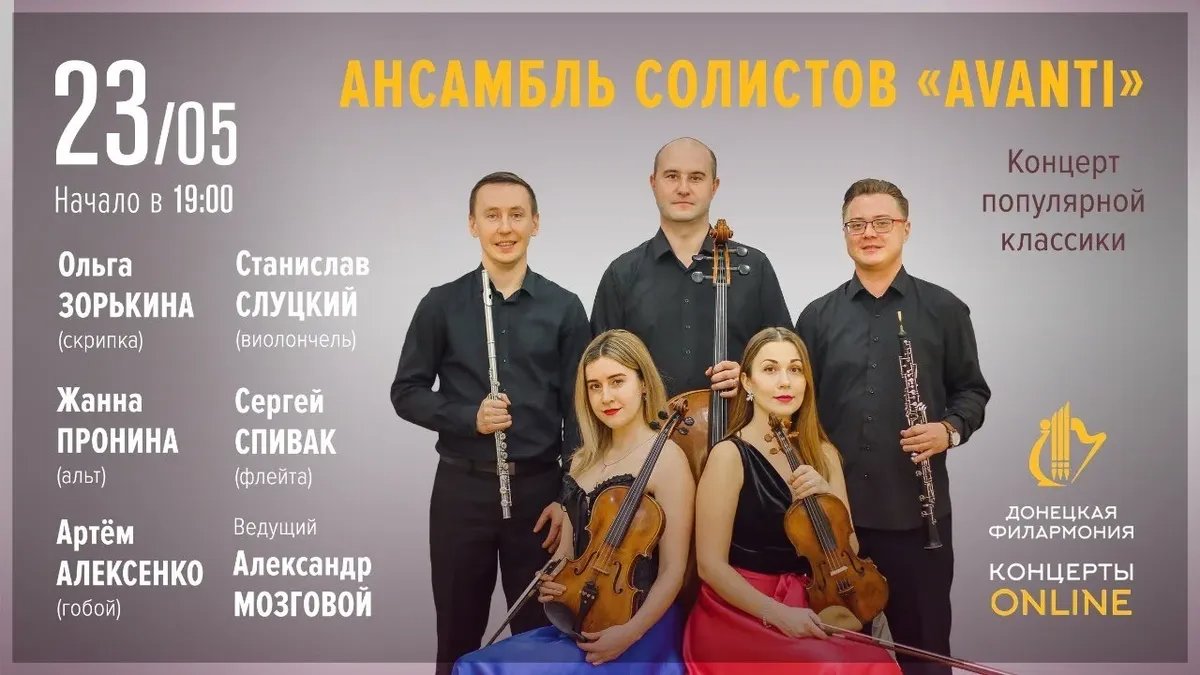
Promotional poster of a concert held by the band Avanti. Sergey Spivak and Stanislav Slutsky are standing on the left and in the centre, between them sitting is the viola player Zhanna Pronina. On the right stands Artyom Alexeenko.
In the Donetsk Philharmonic Society, Sergey Spivak and Stanislav Slutsky together with Zhanna Pronina were part of the band Avanti. On 27 February, they were supposed to perform in a concert, but the war started. The society’s website says that all five musicians are soloists and that their music sounds different “due to violin, viola, and cello being accompanied by oboe”. Artyom Alexeenko is the one playing oboe, the other two members of the band are women.
The interlocutors of Novaya Gazeta. Europe say that Alexeenko, Slutsky, and Spivak were all also drafted through the philharmonic society but they do not know when exactly. Alexeenko ended up in a hospital.
Three more employees of the Donetsk cultural facilities were killed — they were not present at the Makiivka centre while Matvey was there.
At the end of April, the “DPR”’s Ministry of Culture reported the death of the 51-years-old concertmaster of the Donetsk Music Drama Theatre Sergey Rudov. Later, in July, the theatre’s Vkontakte page shared info about another employee’s death — the vice head of the mechanical department of the theatre Sergey Rudnev was killed. He was survived by his wife and child.
The last obituary to appear was dedicated to the 22-years-old student Vyatcheslav Chalogo — his friend told Novaya Gazeta. Europe that Vyatcheslav had received a drafting summons. His death was reported in July by School of Arts#5 where he worked as a concertmaster. Vyatcheslav was the nephew of a mobilised dancer from the band Donbass, said one of the band’s members.
‘We are basically cannon fodder’
War correspondent Pavel Chuprina went back to Mariupol the day after Matvey’s group had arrived there. On his Vkontakte page, he writes that he has not been in his hometown for ten years.
Upon his arrival, Chuprina went to see his mother. The family reunion was filmed by camera men — this footage appeared in a recent RT film titled Mariupol. Russian City. The description of the film says that it “is the biggest documentary film about the battle for Mariupol — a city that was taken hostage together with its citizens.”
The film gathered almost 1.5 million views on Vkontakte. Chuprina is one of its main protagonists.
The two-hour movie features an episode where Chuprina interviews a saxophonist and a bass player from the philharmonic society — both were drafted together with their colleagues from the Culture Division. The interview goes on for nine minutes. It does not state when the interview was conducted. Neither does it state how exactly the musicians ended up fighting in the war.
At first, Chuprina and the musicians discuss the death of the computer graphics specialist Roman, the obituary for which still has not been published on the society’s socials — Chuprina says that his death still has not been confirmed. Then, the war correspondent gives saxophonist Anton Tkachev medicines sent by his wife and asks him to be in a video he takes on his phone.
“Just a little video-hello for your wife and colleagues.”
“No, I won’t.”
“I’m only here to let it be known that you even exist at all. <...> That everyone is alive, that at least you’re here.”
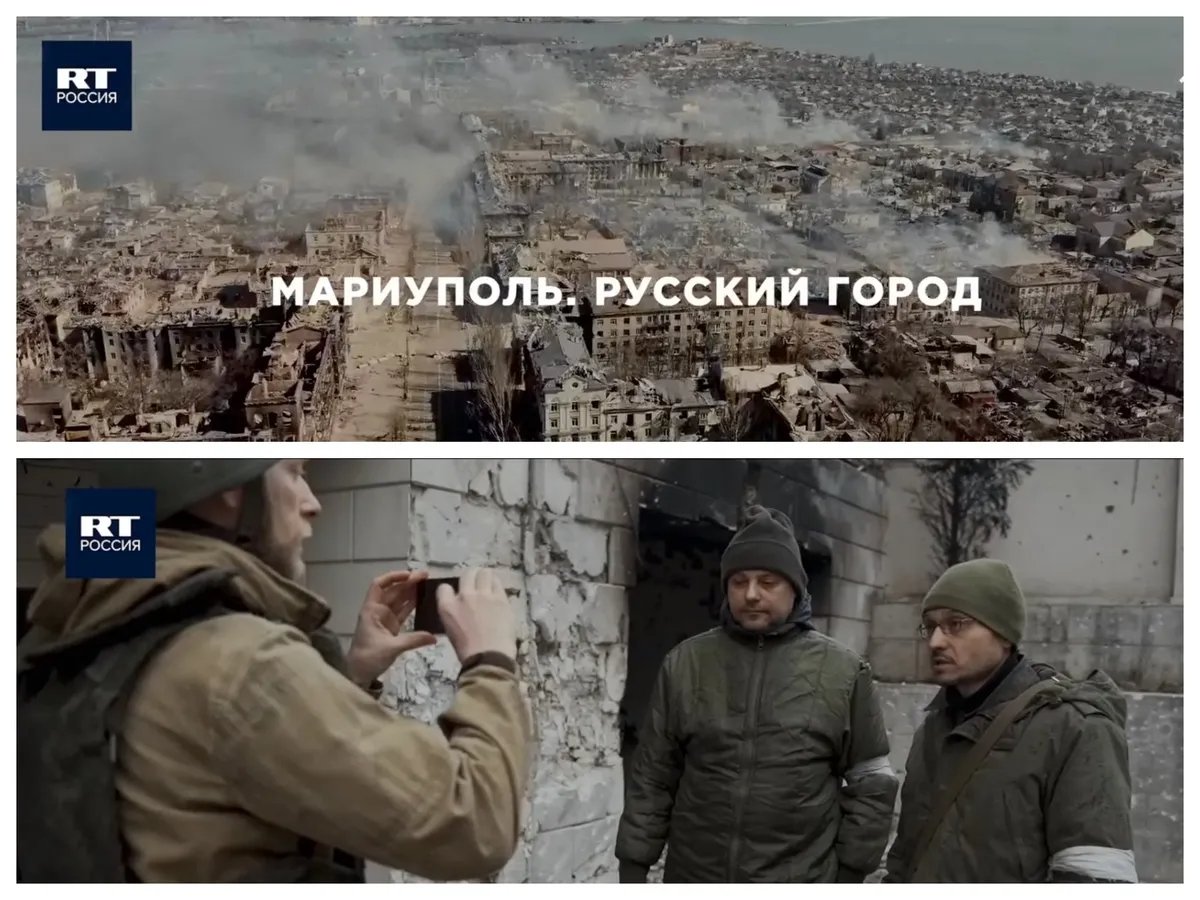
1. The opening titles of RT’s film: Mariupol. Russian City. 2. Pavel Chuprina records the mobilised musicians on his mobile phone. Screenshot: video
The musicians agree silently. In the footage, Tkachev tells his relatives that he wishes for peace. He says that the only thing the artists are good for is carrying shells, they do not need to be at the war. He chooses his words carefully, looking at Chuprin’s phone camera:
“As soldiers we are… zero point… We are basically cannon fodder, I’ll tell you honestly.”
***
On 19 April, Pavel Chuprina wrote on his Vkontakte page that he had transported 215 works of art of the Donetsk born medal artists Yefim Kharabet and Yuriy Shevyakov out of Mariupol.
Chuprina refused to give comments for this story but said that he had been in the nine-storey house#25 on Metallurgov street on the day he had written that Vkontakte post. On the first floor of the house — where Matvey found the notebook — there was a contemporary art centre named after Mariupol born Arkhip Kuindzhi. The medals were kept there.
Later in April, Chuprina took another nine sculptures from the centre. Their author Aleksey Leonov told me that the “DPR” authorities had not contacted him — but the artist was not surprised that his works had ended up in Donetsk. He read that Kharabet’s medals had ended up there too. Chuprina writes that he donated all the items to the Donetsk Republic Local History Museum. In total, more than 2,000 objects were transported to Donetsk from Mariupol — with Chuprina transporting about one tenth of them.
The exhibition hall is not the only place left empty in the houses on Metallurgov street. In July, Telegram channel Mariupol Now posted a picture of a man, who, it seems, returned to his flat in house#27. He is pictured drying his laundry on the balcony — it is clear that the flats above and beneath his flat burnt down. People write that a lot of flats got damaged in the house chat — other pictures show that the houses are now black from all sides.
Currently, the members of the chat are discussing whether the nine-storey buildings on Metallurgov street will be demolished — the official announcement has not been made, but the former residents think that after the shelling and the fire the buildings cannot be restored.
Join us in rebuilding Novaya Gazeta Europe
The Russian government has banned independent media. We were forced to leave our country in order to keep doing our job, telling our readers about what is going on Russia, Ukraine and Europe.
We will continue fighting against warfare and dictatorship. We believe that freedom of speech is the most efficient antidote against tyranny. Support us financially to help us fight for peace and freedom.
By clicking the Support button, you agree to the processing of your personal data.
To cancel a regular donation, please write to [email protected]
